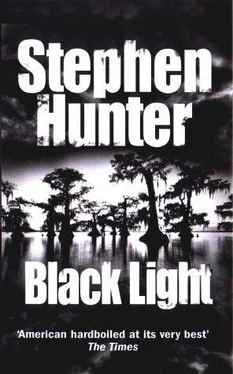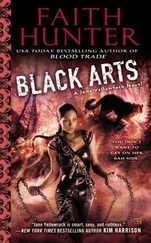Stephen Hunter - Black Light
Здесь есть возможность читать онлайн «Stephen Hunter - Black Light» весь текст электронной книги совершенно бесплатно (целиком полную версию без сокращений). В некоторых случаях можно слушать аудио, скачать через торрент в формате fb2 и присутствует краткое содержание. Год выпуска: 1996, ISBN: 1996, Издательство: Island Books, Жанр: Триллер, на английском языке. Описание произведения, (предисловие) а так же отзывы посетителей доступны на портале библиотеки ЛибКат.
- Название:Black Light
- Автор:
- Издательство:Island Books
- Жанр:
- Год:1996
- ISBN:0-385-48042-3
- Рейтинг книги:3 / 5. Голосов: 1
-
Избранное:Добавить в избранное
- Отзывы:
-
Ваша оценка:
- 60
- 1
- 2
- 3
- 4
- 5
Black Light: краткое содержание, описание и аннотация
Предлагаем к чтению аннотацию, описание, краткое содержание или предисловие (зависит от того, что написал сам автор книги «Black Light»). Если вы не нашли необходимую информацию о книге — напишите в комментариях, мы постараемся отыскать её.
Black Light — читать онлайн бесплатно полную книгу (весь текст) целиком
Ниже представлен текст книги, разбитый по страницам. Система сохранения места последней прочитанной страницы, позволяет с удобством читать онлайн бесплатно книгу «Black Light», без необходимости каждый раз заново искать на чём Вы остановились. Поставьте закладку, и сможете в любой момент перейти на страницу, на которой закончили чтение.
Интервал:
Закладка:
“How do you heat them?” said Bob.
“Essentially, you were shooting at a common household appliance. You just got four toasters. Or, rather, their heating elements. Congratulations.”
“There’s no infrared-light source on this piece,” Bob said.
“No sir,” said the general. “We’re beyond that. We’re beyond even ambient light, the Starlight scopes. That’s passive infrared; no infrared beam and it doesn’t need illumination. The problem with the ambient-light pieces was that they didn’t work in total darkness, they didn’t work in smoke, fog or rain, they didn’t work in daylight, even. They were limited. The Magnavox collects all the infrared energy from the target scene by a single-element silicon aspheric lens. The emerging convergent beam is horizontally scanned by an oscillating mirror and then focused on a vertical linear array of sixty-four lead solenide detector elements which traduce the IR energy into electrical signals. Each detector’s output is fed to a high-gain pre-amplifier. The signals from the sixty-four pre-amplifiers are then multiplexed to a single composite video signal. The composite video signal is then amplified and applied to a miniature cathode-ray tube that is viewed through the monocular eyepiece. It’s MTV for snipers.”
“Pretty goddamned slick,” Bob said. The box did in fact look like a television set, a long rectangular 6×6 tube with the huge round eye up front for a screen, leading back to the eyepiece.
“Well, we’ve come a ways. The Germans used to shoot at concentration camp prisoners. That’s how they tested their first-generation Vampir sight. We shoot at decommissioned toasters.”
“Can the boy try it?”
“No, that’s all right,” said Russ.
“You sure, son?” asked the general.
“It’s fine,” said Russ.
The general turned back to Bob. “It’s not just that the thermal sniperscope is the highest refinement in the night-vision electronics. But what we sell is a whole system. We wholesale from Magnavox, we mount it to the rifle, we manufacture our own suppressor, we pack it into a kit, and we provide trainers and a constant technical hot line and emergency system. That’s not an M-16.”
“It felt heavier than one.”
“It’s a Knight-Stoner SR-25 in .308, shooting a subsonic load. And our JFP MAW-7 suppressor. Unbelievably silent, accurate, lethal, isn’t it? Muzzle blast is caused by high-pressure gases suddenly escaping from the end of the barrel as the bullet exits. Reducing the pressure results in less sound generated. We reduce the pressure by increasing the volume for gas expansion, reducing the gas temperature, delaying gas exit by trapping and turbulence. Damn, it’s a good unit!”
“Yes, it is,” said Bob.
“Nothing like your old 700 Remington?”
“I’d hate to be matched with my old rifle against a fellow with that outfit.”
“You wouldn’t have a chance. The night belongs to the man who can see through it. Imagine the kills you could have gotten in combat with this outfit.”
Bob rose; the demonstration was over.
“Come on back,” said the general. “We’ll talk in my office.”
Jack Preece was a stocky man, with the short neck that was common to many championship shooters; he was handsome and rather slick, with a mane of silver hair and a smooth way about him. He radiated confidence and charm; his skin was tan and his teeth, capped, were white and perfect.
He led them back from the firing range through workshops where the system—the Knight rifle, the night-vision device, the sound suppressor—was being assembled into kit form, a single plastic case, after assembly, zeroing and disassembly, for shipment at no doubt a pretty penny to the elite marksmanship units of the world—Delta, various special forces units, SEAL Team Six, a Ranger battalion, the FBI’s HRT, various big-city SWAT units.
“That Knight rifle gives us an enormous advantage over even the M-21s. We can get minute-of-angle accuracy out of a semiauto; we can get second or third shots without breaking the shooter’s spot-weld with a bolt gun’s accuracy. Bob, the days of the bolt gun are over. By the decade’s end, all the world’s elite sniper teams will be shooting semiauto.”
“I think I’ll keep mine awhile,” said Bob, and the general laughed.
He ushered them into his office, a small paneled warren, one wall of which was filled with marksmanship trophies from a hundred forgotten high-power rifle championships the world over, as well as photographs of men with rifles standing or kneeling around a trophy, each with a fancy target rifle in his hands. Bob glimpsed and read a shooting history etched on brass plates: Interzonal U.S. Army Champion, 1977; Panama Games, Standing Rifle, 1979; NRA High Master; Alabama High Power, Sitting Champion, 1978; and on and on.
“No Wimbledon Cup up there,” said the general. “My best year, you took it. Nineteen seventy-one.”
“Sir, if I’d have known you had a gap in your trophy case, I’d have dropped a shot or two!”
The general laughed. “It’s all shit, of course. But I have customers in here all the time. It impresses them. Now, what’s on your mind, gentlemen?” He lit a cigar and leaned back in his chair comfortably, as if looking forward to a good time.
“Sir,” said Russ, “I’ve been hired to coauthor Bob Lee Swagger’s story for the Presidio Press in San Francisco. We wanted to at least touch on the wider shape of the story: that is, American sniping in Vietnam as programs and how they affected the war. There’s not a lot of data on the army’s, yet I understand the army snipers got much higher kill rates than the marines.”
“It had nothing to do with the quality of men,” said the general with an executive’s practiced smoothness. “At the senior noncommissioned officer level, the American services all have extremely talented and motivated individuals. The marines have stayed wedded to marksmanship as the core of their service; that’s fine, as history has proven out time and again. The army has been charged with staying at the cutting edge of ground combat technology. That was my job. That’s where Tigercat came from. We started in the early fifties trying to develop a technology that would give the night to the American sniper.”
“The M-3 sniperscope,” prompted Bob.
“A piece of junk,” said the general, expelling a large curling cumulus of smoke. “Bulky, clumsy, awkward, with a distressing propensity toward showing the vegetation more clearly than the enemy. So heavy it could only be mounted on a light rifle like the puny carbine. But … a start.”
“Yes sir,” said Bob. “No doubt, if we’d have had your gear in the Nam, we could have kicked ass big-time.”
The general wasn’t really listening.
“Do you know what the difference between the marine and the army sniper programs was? I mean, speaking frankly. I love the spirit of the marines, but our kills were so much higher. Do you know why?”
Russ inwardly blanched. He knew this was the last thing Swagger would want to hear from this grinning, self-promoting baboon.
“No sir,” said Bob evenly.
“The marines somehow couldn’t commit at the conceptual level to the idea of technology. At some fundamental level, they believed still in the romantic notion of individual heroism. They somehow refused to enter the modern age. You marine snipers were like World War I pilots or cowboy gunslingers, going off on your own to do battle with the enemy and taking him out one-on-one. We believed in team spirit, sophisticated technology and body counts. Our body counts were so much higher. We saw through to the heart of it: it was about killing the enemy, not dueling him. And our sniper teams moved in and left nothing but step-ons. When we put a V.C. down, we didn’t count it until the next morning we could put our boot on his chest. We called them step-ons.”
Читать дальшеИнтервал:
Закладка:
Похожие книги на «Black Light»
Представляем Вашему вниманию похожие книги на «Black Light» списком для выбора. Мы отобрали схожую по названию и смыслу литературу в надежде предоставить читателям больше вариантов отыскать новые, интересные, ещё непрочитанные произведения.
Обсуждение, отзывы о книге «Black Light» и просто собственные мнения читателей. Оставьте ваши комментарии, напишите, что Вы думаете о произведении, его смысле или главных героях. Укажите что конкретно понравилось, а что нет, и почему Вы так считаете.












